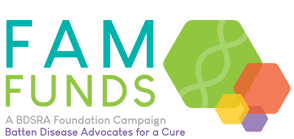Educational Resources
Educating a student with Batten disease presents unique and significant challenges to the child or teen’s family, his or her teachers, and to school administrators. Many are not familiar with Batten disease due to its rare occurrence and are unsure how to best meet the special needs of the student.
BDSRA provides materials and support services to help school systems learn more about how they can best serve students with Batten disease. Enhancing the student’s quality of life is our first and foremost goal.
Here is a sampling of some of the concerns raised by parents of children who have Batten disease:
“I’m confused as to what an Individualized Education Plan (IEP) should include for my child — where do I start?”
“My child is young — are there educational services for preschoolers with Batten disease?”
“My school isn’t following the IEP that we set up for my child — what should I do next?”
“My child has severe behavioral issues — how should the school address these?”
“I’m concerned about my child’s inability to fight infection and school environments are notorious for spreading germs — what are your recommendations during flu season?”
You can request the Juvenile Neuronal Ceroid Lipofuscinosis (JNCL) and Education books by reaching out to Patrick Kotnik, by phone at (614)973-6013 or email at patrick@bdsrafoundation.org. BDSRA and families contributed to the content that will be in the book by participating in an extensive online survey.

School Accommodations
The student’s special needs in the classroom will depend on where he or she is in the arc of the disease process and will vary greatly due to individual differences. Our premiere school resource, the “Teach and Be Taught” manual helps in educating members of the child’s education team: the family, teachers, principals, therapists, aides, bus drivers, other students and members of the child’s school and community network. It contains specific recommendations and suggestions for making a variety of accommodations in the school setting.
To order the “Teach and Be Taught” manual and contact Patrick Kotnik, by phone at (614)973-6013 or email at patrick@bdsrafoundation.org.
Although there is no known cure for Batten disease, the progression of the disease is well-documented and somewhat predictable, thus serving as the foundation for the guide content (although there are individual differences, as in any disease process). We encourage parents and caregivers to share as much information as possible pertaining to the child’s medical condition, his or her abilities, strengths, and limitations. Regular communication is a key component to optimizing your child’s success in the classroom.
Learn More about Batten disease & Share With Others
In addition to the “Teach & Be Taught” manual and information about Batten disease is available on our web site. Stay connected to BDSRA on social media and help us to raise awareness by sharing BDSRA posts and tweets!
- Learn more about specific types of Batten disease – https://bdsrafoundation.org/what-is-batten-disease/
- For updates about developments in Batten Disease and BDSRA news, check out our e-newsletter “The Illuminator” – https://bdsrafoundation.org/about-bdsra/illuminator-newsletter/
- Connect to other supporters in the Batten disease community via social media: Click here to “Like” the BDSRA Facebook page – https://www.facebook.com/bdsra
- Follow BDSRA on Twitter – https://twitter.com/BDSRA
Helpful Links and Resources
Parents and Caregivers may join the BDSRA Closed Facebook by clicking here. Our Batten families are experts and can provide timely advice and tips that have worked for them. Keep in mind that individual differences and varying state laws and regulations may affect your child’s school situation.
- Special Education Guide, this site includes a guide to disabilities categories that are covered under IDEA http://www.specialeducationguide.com/disability-profiles/
- Wright’s Law This informative web site is chock-full of articles, cases, and links that explain about many aspects of special education and advocacy. It was created by Pete and Pam Wright: he is an attorney specializing in special education law and she is a psychotherapist who has worked with children and families for decades. Together, they have assembled this elaborate parent resource, while also conducting workshops around the country as well.
- U.S. Department of Education, Office of Special Education and Rehabilitative Services, including IDEA 2004 http://www2.ed.gov/about/offices/list/osers/osep/index.html
- The Disability Scoop, the premier source for Developmental Disability News
- National Association of Councils on Developmental Disabilities Find your state’s council for Developmental Disabilities to learn more about disability services and rights of those with developmental disabilities
- The Center for Parent Information and Resources (CPIR) serves as a central resource of information and products to the community of Parent Training Information (PTI) Centers and the Community Parent Resource Centers (CPRCs), so that they can focus their efforts on serving families of children with disabilities.
- Epilepsy Foundation of America “Managing Seizures at School”
- Centers for Disease Control and Prevention
- Epilepsy Training for Students, Teachers, and Nurses
- CDC Statement of Persons with Neurologic Involvement and the Flu
- Preventing the Flu
- How the Flu is Spread
- Taking Care if You Get Sick
- Caring For Someone Sick at Home
- Vaccine Information Sheet (Injectible)
- Vaccine Information Sheet (Intranasal)
- Spanish Speaking Flu Information
- Feeding Tube Awareness Foundation


